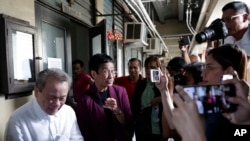A Philippine court’s pending verdict in a rare cyber libel case is shaping up as a new benchmark for the Southeast Asian country’s on-again, off-again media freedoms.
A Manila Regional Trial Court branch is believed to be wrapping up a case brought against the domestic online media outlet Rappler; its chief executive officer, Maria Ressa; and former researcher-writer Reynaldo Santos Jr., Ressa told VOA.
The defendants are charged with cyber libel over an investigative report on a former chief justice. The court has delayed a verdict indefinitely, Ressa said, noting that it’s closed as part of a Metro Manila lockdown aimed at controlling the spread of COVID-19.
A ruling against the defendants would signal an ever-tougher stance by the administration of President Rodrigo Duterte toward mainstream news outlets that cover the government critically, scholars and media freedom advocates say.
Most media outlets would keep operating freely after any verdict against Rappler, they say, but major outlets risk legal problems of the kind pending now if they criticize Duterte’s government too often.
“On balance there’s still space for media expression in the Philippines, but of course the feeling of media professionals is that they would be more careful in terms of crossing the line with Duterte, so to speak,” said Eduardo Araral, associate professor at the National University of Singapore’s public policy school.
Media freedom declines
Philippine media gained freedoms after martial law ended in the 1980s under former President Ferdinand Marcos. But the Southeast Asian democracy of more than 100 million people continued its decline in media freedom in the past two years. It ranks 136th out of 180 countries, a shift of two places, in the media watchdog Reporters Without Borders’ 2020 World Press Freedom Index.
The cyber libel case alarms the media because it targets an eight-year-old story under a law that was enacted four months after it was posted. The Department of Justice said separately last year that the law could cover cases up to 12 years old. That sequencing points to a coordinated attack on Rappler, media observers say.
Observers said last year that the Duterte government wanted to stop Rappler’s numerous articles criticizing its anti-drug campaign and problems involving the Philippine armed forces. The tough-talking Duterte took office in 2016 on pledges to wipe out drug crimes, but has come under international criticism over shoot-to-kill police raids.
Rappler has questioned military officials for considering a renegotiation of a mutual aid treaty with the United States and accused Duterte of abandoning his leftist sentiments in a fight against communist rebels.
“If Maria Ressa is convicted, it would amount to a threat to every working journalist in the Philippines, and therefore would undermine press freedom,” Steven Butler, Asia program coordinator with the U.S.-based advocacy group Committee to Protect Journalists, told VOA. “It's absurd that a journalist could be prosecuted, much less found guilty, under a law that was enacted only after the alleged misconduct took place.”
Questions about media freedoms have become sharper under Duterte as lawmakers push to revoke a license of Philippine television network ABS-CBN Corp. Duterte has accused the network of bias and not airing political advertisements during the 2016 election campaign.
In another unexpected challenge for the media, reporters are being asked to get permits to go out for work during the lockdown of Metro Manila, a COVID-19 containment measure.
“I guess the word I’d describe would be a ratcheting down,” said Herman Kraft, political science professor at the University of the Philippines Diliman, describing the media’s boldness in reporting.
'Chilling effect'
Anti-fake-news laws approved under Duterte also lack “clear parameters,” said Renato Reyes, secretary-general of the Manila-based Bagong Alyansang Makabayan alliance of leftist political organizations. A verdict against Rappler would have a “chilling effect” on all media, Reyes said.
“There has to be some form of checks and balance on the huge power that the president yields, and you need the media to provide those checks and balance,” he said.
Duterte has no stated policy of curbing media freedoms, but in 2017 he asked reporters to avoid lies, “sensationalized news” and “overpublicized political propaganda.”
The justice department charged Ressa and Rappler with cyber libel in February 2019 over a May 2012 article about possible ties between a Philippine businessman and a former president of the Philippine Supreme Court. Ressa was arrested and spent a night in jail before posting bail the next day.
Ressa, who also is Rappler’s co-owner and a former CNN investigative reporter, faces a sentence of up to 12 years if convicted.
Alleged link to trafficking
Rappler’s story in question linked the former justice, Renato Corona, to Philippine businessman Wilfredo Keng and cited an intelligence report allegedly connecting Keng to drug and human trafficking, Rappler reported.
Keng filed a case against Rappler in 2017 with the National Bureau of Investigation cybercrime division. He disputes the linkage to trafficking and drug smuggling, Rappler has reported.
The court was scheduled to rule on the case twice this month but has postponed its decision indefinitely, Ressa said. She declined to give her views on the case itself.
If found guilty, the defendants have the right to appeal to the Philippine Supreme Court.










